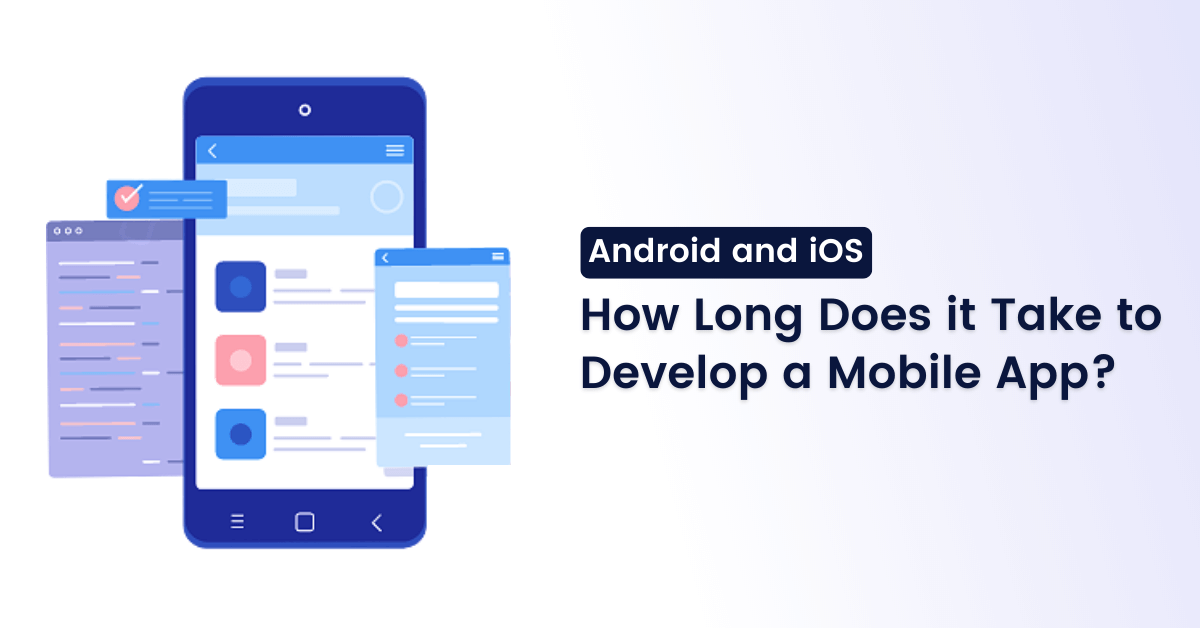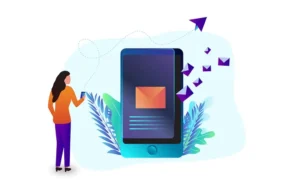
This is the most common question that businesses ask: How long does it take to create a mobile application?
The app development process and timeline require more than just a financial investment. It requires a significant investment of time, which is to say, a lot of work. The time it takes to develop a mobile app depends on the app itself and the team who builds it.
However, the following estimates can give you an idea about how long it takes to make mobile apps.
General Mobile App Development Timeline
To give you an idea, let’s begin with some general estimates. The app development process usually takes between two and three months.
There are three phases, each lasting two to three months.
The initial phase takes two weeks and is dedicated to mock-ups and design.
Depending on the complexity of your app, the development phase usually lasts for five weeks. This phase includes A/B Testing and other tests.
Once the application has been developed, it will take one to two weeks for the application to be prepared and submitted to the appropriate market.
Keep in mind, however, that this is rarely the end of the app development process. App developers often release new versions of their apps after they have gathered user feedback and monitored their app’s performance. A perfect app is the result of multiple updates and changes to meet all users.
What can an application type do to affect the time it takes to develop an app?
The above-mentioned timeline for mobile app development is only an estimate.
Every application is unique and every development team works differently. The time it takes to build an app will depend on what type of app you plan and which Mobile app development agency is chosen.
Based on our field experience, however, we can provide an estimate of the average cost of developing mobile apps.
- It can take 6-12 months to develop a graphics-intensive application, such as a game.
- App development can take up to four months if an app requires the main server.
- A stand-alone, relatively simple application that doesn’t require internet support can often be developed in as little as 2 to 3 months.
Three types of mobile applications exist in the market
- Native Applications are the top end. They enable smartphones to use their internal functions (camera and GPS, accelerometer, etc.). They use different mobile technologies depending upon the OS. Each OS requires a specific version.
- Hybrid Applications only require one version for each OS. This can be a cost-saving solution that can reduce the time it takes to develop apps.
- Progressive Web Applications offer real benefits. It’s natural referencing from Google is the first asset. Its ability to be used on multiple screens is the second. Its compatibility with native apps and its easy installation on mobiles is the third. This is possible by knowing what software is available for creating a mobile app.
A shorter App development process and the timeline do not necessarily mean that it is less efficient. A longer timeframe for mobile app development does not necessarily mean a more advanced application. Make sure the timeframe provided by your mobile app developers team corresponds to the type of app you want!
For faster development that doesn’t sacrifice quality, work with an experienced team!
You can see that the time it takes to create mobile apps varies depending on the project. Although there is no single solution, we hope that the information provided will give you some insight into what to expect.
Keep in mind, however, that the average time it takes to create mobile apps depends on who you are working with. The level of expertise and experience of your team will affect the time it takes to develop your app.
This is why it’s important to hire experienced developers who have a solid understanding of the best processes and techniques to speed up development without compromising quality.
For an estimate and quote on your mobile app development project, please contact our team.
To conclude
Many other factors will have an impact on the App development process and timeline. The addition of social media integration features, as well as connection and sharing, will require an additional one- to two weeks.
The addition of functionalities can also be a source of disagreement. The number of functionalities you wish to include in your mobile app will affect the development time and cost.
Artoon Solutions recommends that you stick with your Minimum Viable Product ( MVP) for your first mobile app. You will quickly receive feedback from your users by creating a basic version of your app. This will help you decide which features are most important and what to add to future updates.
Important point: Don’t forget about the design process! Partnering with developers who use a sprint approach to app development can help you reduce the time it takes. It will take longer to develop an app with a custom interface than one with a more basic interface.
You can’t afford to pay attention to the design of your mobile app. It will have a huge impact on how many people download it.
Remember, the platform you choose to host your app also has an impact on the development timeline.
You can choose between Android and iOS if you need to quickly create your app. Each platform is unique and requires different design, development, and testing, which can significantly increase the time it takes to develop an app for multiple platforms. We recommend investing in iOS app development, except where you are targeting priority emerging markets (Africa, Asia).
Due to the variety of Android smartphones, it takes 30 percent longer to develop an Android application than an iOS application.






